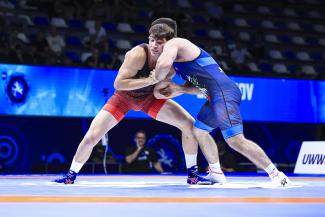Azerbaijan, Romania crown 4 beach wrestling world champs
Friday, September 2, 2022 - 09:52 By Vinay Siwach

CONSTANTA, Romania (September 1) -- When Huseyn SEVDIMOV (AZE) was introduced to beach wrestling, he was unsure if he wants to pursue a career in the sport.
But that was a year ago. Just five months since his first practice, Sevdimov won the European Championships in July. He added a World Championships gold medal on Thursday to his resume and continued his exponential rise in beach wrestling.
"I am extremely happy about winning the gold medal at the World Championships," Sevdimov said. "I have been training for one year in the sand just for this competition."
It worked well for him as he won the five bouts with superiority [winning 3-0] or fall [a 3-0 win in], including one over Gaspard CHEYNOUX (FRA) in the gold medal bouts.
"I did not want to give any chance to my opponents to score on me," he said. "Now that I have won, I hope the other guys can win the gold medal as well."
After Sevdimov, three other Azerbaijan wrestlers won gold medals to sweep all the titles at the U17 World Championships at the Mamaia beach in Constanta, Romania.
At 60kg, Ziya GOYUSHOV (AZE) won the gold medal after beating Ionut TRIBOI (MDA), 3-0, in the final. He was as dominant as Sevdimov if not more than his compatriot.
Over the six bouts, Goyushov outscored his opponents 17-0 including a victory by fall.
It appeared Ilias KARNAVAS (GRE) will break the Azerbaijan streak as he the lead in the 70kg final against Vusal ALIYEV (AZE). But as the bout progressed, Aliyev composed him and scored a 3-1 win to win the gold.
At 80kg, Anar JAFARLI (AZE) won the gold medal after a tough final against Ion MARCU (MDA). Jafarli conceded a point and found it difficult to score but Marcu began losing steam which allowed Jafarli to get on the scoreboard. His continued pressure helped him win 3-1.
Earlier in the day, he had a thrilling Round 2 bout against Lars MICHAELSON (USA), winning 3-2. Michaelson took a 2-1 lead with a minute remaining but Jafarli used snap downs to win the bout.
Part of Azerbaijan's domination at the age-group level can be credited to its coach Oyan NAZARIANI (AZE), a former world champion in beach wrestling.
Nazariani runs the national training center in Baku and has built an indoor center as well to train wrestlers in the winter.
"I am happy to see our wrestlers win," Nazariani said. "We trained in beach wrestling and to be world number one means it's the feedback of our good training."
Nazariani has been the leader of the sport in Azerbaijan, winning the gold at the 2018 and 2019 World Series and a bronze medal at the World Beach Games in Qatar in 2019. A hand injury has kept him out this season but he continued to train the young wrestlers.
"We train on the Caspian sea beach in summers and the indoor ring in winters," he said. "I tell them to focus on not touching knees and elbows and we hosted the national championships for the first time as well.
"If you ask them, they will say they are beach wrestlers and not just wrestlers."

Perfect Romania
In the women's category, Romania won all four gold medals, claiming the team title as well. Such was its domination that Romania had seven finalists out of the eight.
At 40kg, Diana VOICULESCU (ROU) defeated Bianca IANCAU (ROU) even after giving up the first point. She used a three-point move to finish the final via fall.
Alexandra VOICULESCU (ROU) was the second gold medal as she defeated Ana ROTARU (ROU) in the 50kg final. In the full three-minute bout, Voiculescu won 2-0.
In the only final which did not have both Romanian wrestlers, Alessandra ELLIOTT (USA) tried stopping Florentina MANTOG (ROU) from winning the gold but the latter proved too strong and won the 60kg gold medal 3-1.
The final gold medal was won by Maria PANTIRU (ROU) as she defeated Ionela COJOCARU (ROU), 3-1, winning the 70kg gold medal 3-1.


Share your thoughts.
Comments